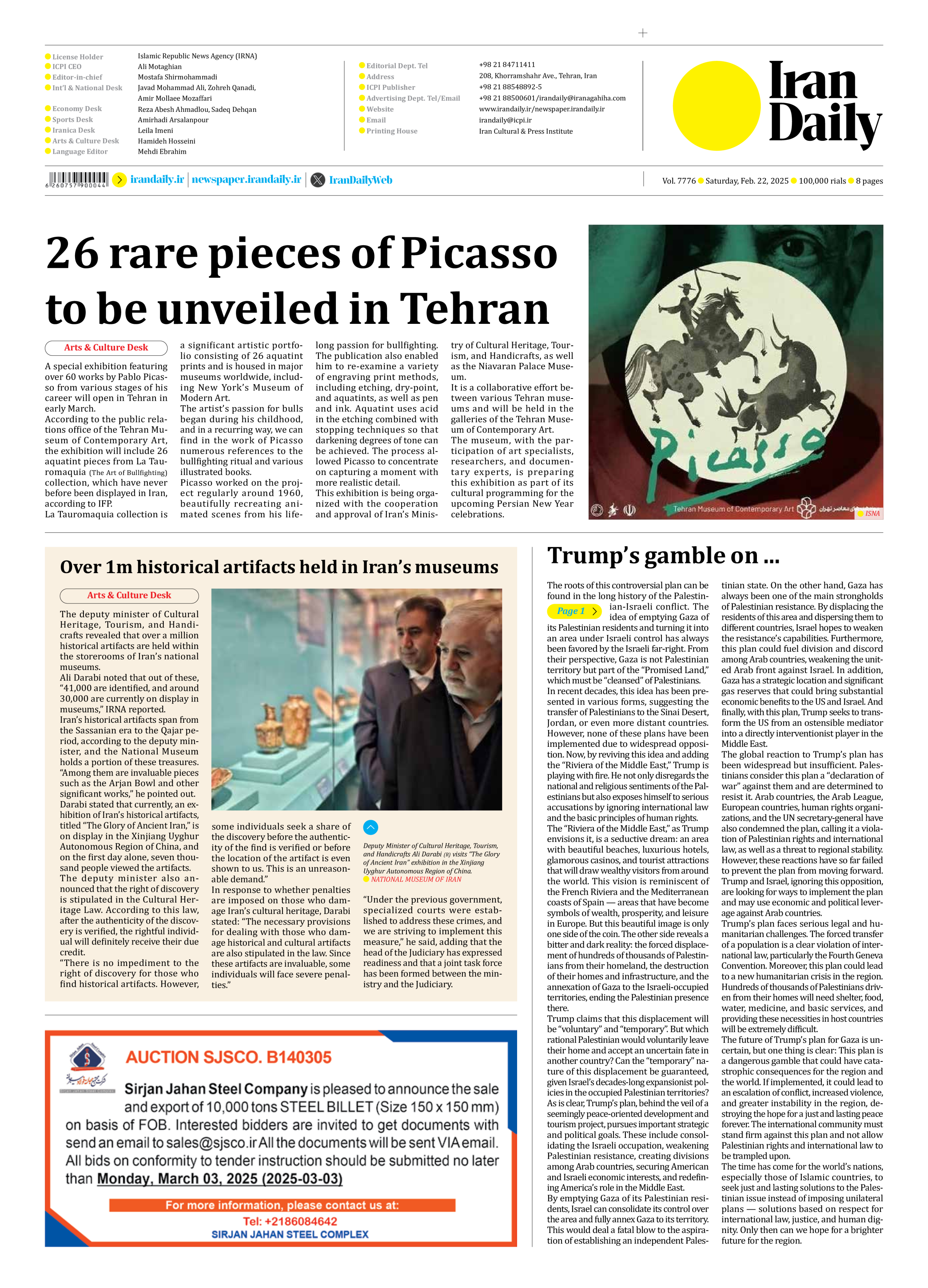
Trump’s gamble on ...
Page 1
The roots of this controversial plan can be found in the long history of the Palestinian-Israeli conflict. The idea of emptying Gaza of its Palestinian residents and turning it into an area under Israeli control has always been favored by the Israeli far-right. From their perspective, Gaza is not Palestinian territory but part of the “Promised Land,” which must be “cleansed” of Palestinians.
In recent decades, this idea has been presented in various forms, suggesting the transfer of Palestinians to the Sinai Desert, Jordan, or even more distant countries. However, none of these plans have been implemented due to widespread opposition. Now, by reviving this idea and adding the “Riviera of the Middle East,” Trump is playing with fire. He not only disregards the national and religious sentiments of the Palestinians but also exposes himself to serious accusations by ignoring international law and the basic principles of human rights.
The “Riviera of the Middle East,” as Trump envisions it, is a seductive dream: an area with beautiful beaches, luxurious hotels, glamorous casinos, and tourist attractions that will draw wealthy visitors from around the world. This vision is reminiscent of the French Riviera and the Mediterranean coasts of Spain — areas that have become symbols of wealth, prosperity, and leisure in Europe. But this beautiful image is only one side of the coin. The other side reveals a bitter and dark reality: the forced displacement of hundreds of thousands of Palestinians from their homeland, the destruction of their homes and infrastructure, and the annexation of Gaza to the Israeli-occupied territories, ending the Palestinian presence there.
Trump claims that this displacement will be “voluntary” and “temporary”. But which rational Palestinian would voluntarily leave their home and accept an uncertain fate in another country? Can the “temporary” nature of this displacement be guaranteed, given Israel’s decades-long expansionist policies in the occupied Palestinian territories?
As is clear, Trump’s plan, behind the veil of a seemingly peace-oriented development and tourism project, pursues important strategic and political goals. These include consolidating the Israeli occupation, weakening Palestinian resistance, creating divisions among Arab countries, securing American and Israeli economic interests, and redefining America’s role in the Middle East.
By emptying Gaza of its Palestinian residents, Israel can consolidate its control over the area and fully annex Gaza to its territory. This would deal a fatal blow to the aspiration of establishing an independent Palestinian state. On the other hand, Gaza has always been one of the main strongholds of Palestinian resistance. By displacing the residents of this area and dispersing them to different countries, Israel hopes to weaken the resistance’s capabilities. Furthermore, this plan could fuel division and discord among Arab countries, weakening the united Arab front against Israel. In addition, Gaza has a strategic location and significant gas reserves that could bring substantial economic benefits to the US and Israel. And finally, with this plan, Trump seeks to transform the US from an ostensible mediator into a directly interventionist player in the Middle East.
The global reaction to Trump’s plan has been widespread but insufficient. Palestinians consider this plan a “declaration of war” against them and are determined to resist it. Arab countries, the Arab League, European countries, human rights organizations, and the UN secretary-general have also condemned the plan, calling it a violation of Palestinian rights and international law, as well as a threat to regional stability. However, these reactions have so far failed to prevent the plan from moving forward. Trump and Israel, ignoring this opposition, are looking for ways to implement the plan and may use economic and political leverage against Arab countries.
Trump’s plan faces serious legal and humanitarian challenges. The forced transfer of a population is a clear violation of international law, particularly the Fourth Geneva Convention. Moreover, this plan could lead to a new humanitarian crisis in the region. Hundreds of thousands of Palestinians driven from their homes will need shelter, food, water, medicine, and basic services, and providing these necessities in host countries will be extremely difficult.
The future of Trump’s plan for Gaza is uncertain, but one thing is clear: This plan is a dangerous gamble that could have catastrophic consequences for the region and the world. If implemented, it could lead to an escalation of conflict, increased violence, and greater instability in the region, destroying the hope for a just and lasting peace forever. The international community must stand firm against this plan and not allow Palestinian rights and international law to be trampled upon.
The time has come for the world’s nations, especially those of Islamic countries, to seek just and lasting solutions to the Palestinian issue instead of imposing unilateral plans — solutions based on respect for international law, justice, and human dignity. Only then can we hope for a brighter future for the region.







